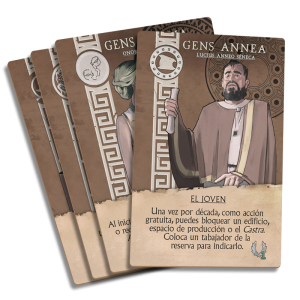
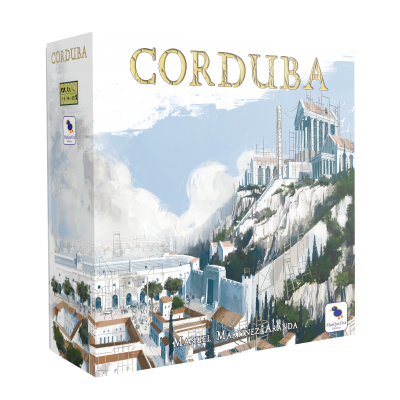
It is 49 B.C. when Julius Caesar gathers in Corduba the leaders of the main colonies of Hispania Ulterior, where he thanks them for their support during the war. The struggle between Caesar and Pompey came to an end with a clear winner, but not all Roman citizens were in favor of Caesar.
A year later, the cruel governor and Caesar’s right-hand man in the province, the praetor Quintus Cassius Longinus, suffered an attack on his way to the city’s basilica. Such an act was the prelude to what would happen two years later, when, making use of the power granted by the name of Pompey, and squeezing the resources of the Roman province itself, Cnaeus and Sextus, sons of Caesar’s former ally and enemy, had taken control of the whole of Hispania, including the Roman colonies of Italica and Corduba. Cnaeus and Sextus Pompey had assembled an army of thirteen legions composed of veterans loyal to Pompey, Roman citizens of Hispania and the remnants of his army defeated in Africa.
Caesar traveled to the capital of Hispania to crush the rebellion. After losing a first battle against Cnaeus for control of the bridge, Caesar was forced to spend the winter in Ategua, which led to the sacking of the area to supply his army. Many joined the rebellion of Pompey’s sons, but they were not enough. Forced to take refuge in the city after the battle of Munda, Cnaeus and Sextus are besieged by Caesar’s army, which takes the city by assault. Sextus manages to escape Caesar’s wrath, but his brother Cnaeus dies along with 22,000 other Cordubenses. As punishment for supporting the rebellion and hiding its instigators, the city is practically destroyed.
In 27 B.C., almost two decades later, the first emperor, Augustus, sends representatives of the most influential Roman families to Corduba to restore the city’s status. To do so, they must rebuild the city and attend to the needs of its inhabitants. All under the watchful eye of Rome. The players, heirs of different patrician families sent from Rome, will compete for the right to be proclaimed the next Governor, but to do so they will have to win the vote of the people, and of Rome.
The game takes place over three decades, each of them divided into three rounds
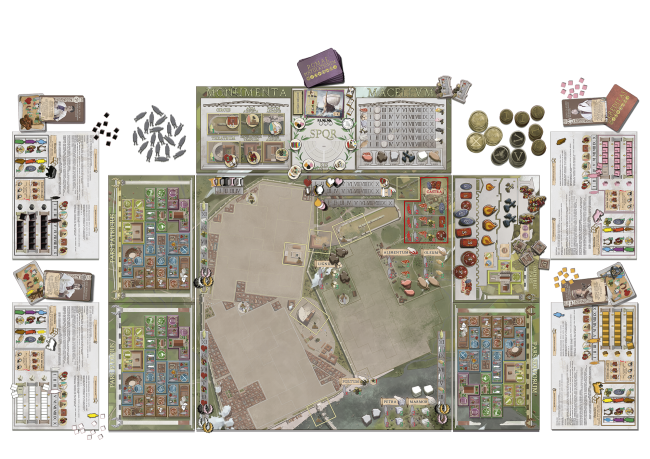
During a round, players will take turns performing actions until everyone decides to pass. With these actions players will produce resources, construct buildings and monuments, train legions and attend to the religious needs of the population. To do this, players will have a number of workers and specialists that will increase as the population of the city increases. It is important to emphasize that Corduba is not a game of tile placement. It is a game of action construction, with mechanics of worker placement and resource management.
The actions available at the beginning of the game are scarce, and all of them are related to obtaining basic resources for the construction of buildings or the training of troops. However, as players construct new buildings, the available actions will increase, as each building constructed grants a new action to the game. The combinations and strategic possibilities are overwhelming.
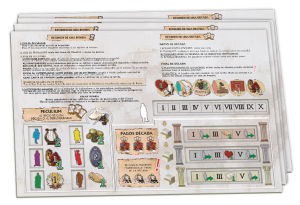
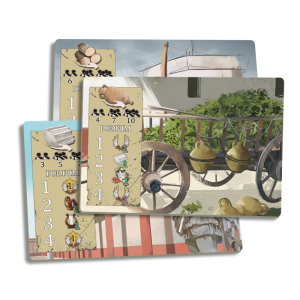

Another of Corduba’s strengths is its evolution. The game is played over nine rounds grouped in three decades. At the end of each round, the buildings are freed of workers, so they are available again for the next round. This means that all buildings that have been constructed are available to all players, regardless of who built them. In addition, as more and more actions become available, the strategic possibilities multiply. All actions are important, so you continually have the feeling that someone else has anticipated your move and occupied the building you wanted to activate or built what you wanted to build. Although the rules do not change from round to round, you will find that the game does. The feelings during the early rounds are very different from the later ones.
Corduba has no victory points. To win the game you have to win the favor of the citizens of the city and of Rome. Constructing buildings in the different neighborhoods will increase your reputation in them. Bringing the largest army to the Roman cohorts or making the largest offering to the gods also helps to win the favor of the Senate. And of course, helping the city meet the demands of Rome. At the end of each decade, players will have the possibility to add Senators to the Senate Chamber. But all that glitters is not gold, and on occasion, citizens will revolt. Revolts are something players will have to fight against. This does not mean that they have to cooperate against them, but if they are careless, the whole city can fall, causing everyone to lose the game.
Corduba is the summit of strategic possibilities. Each game will develop according to the buildings and monuments constructed, the combinations of families and inheritances chosen, the demands of Rome, the fluctuation of the resource market, the Res gestae (milestones) available… Even if you try to play the same way as in a previous game, you will not get the same experience. In short, no game of Corduba will be the same as any other you have played, and in each game you will discover different strategies and combinations.
Corduba is a game with simple rules that allows anyone to understand it quickly, but with a depth that makes it a challenge for lovers of hardcore games.
